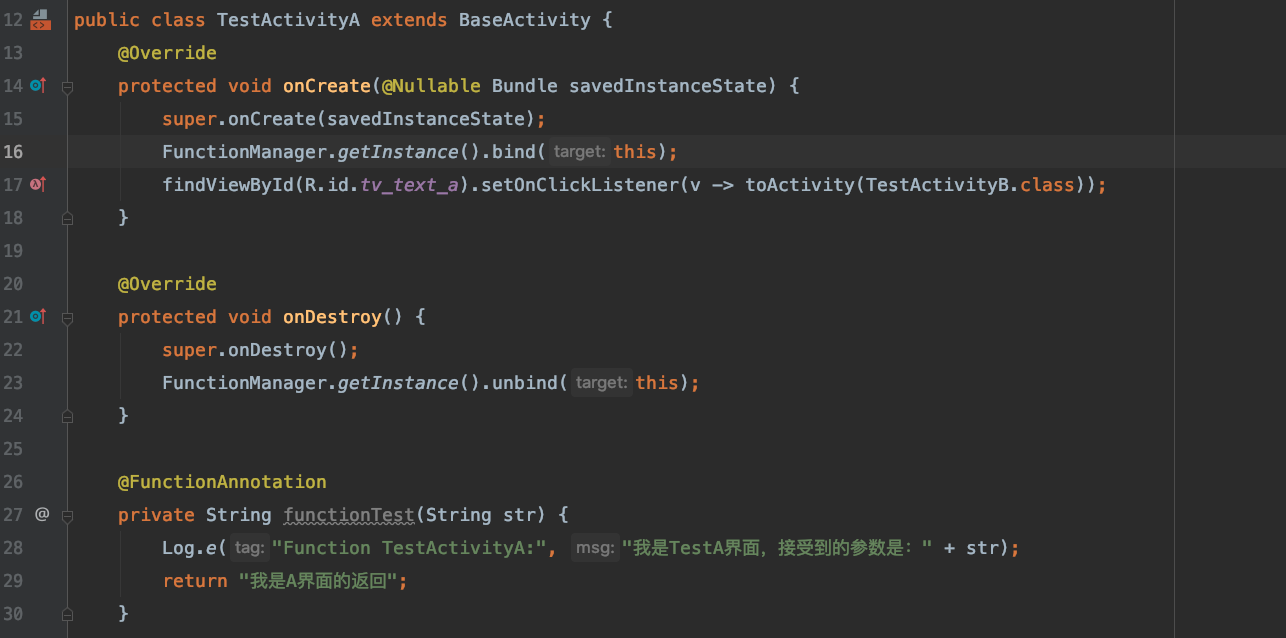学习地址:study.163.com/smartSpec/i…
昨天将老师讲的代码手撸了一遍: juejin.cn/post/684490…
今天按照自己的想法优化一下,先上一下使用方法:
调用:
调用的时候不需要bind,直接使用invokeFunction方法就行了

实现:
在onCreate中调用FunctionManager.getInstance().bind(this);
在onDestroy中调用FunctionManager.getInstance().unbind(this);
在需要被调用的方法上添加@FunctionAnnotation注解,方法名字需要和上图中的方法名一致

效果

改造开始
1.编写annotation
//这是一个自定义的注解,主要是为了标识方法
@Target(ElementType.METHOD) // 作用在方法之上
@Retention(RetentionPolicy.RUNTIME)// 运行时
public @interface FunctionAnnotation {
}
2.改造FunctionManager
public class FunctionManager {
private static FunctionManager instance;
private HashMap<String, Function> mFunctionMap;
// 保存所有target的集合
private List<Object> targetList;
// 目标对象
private Object target;
// 目标方法tag,用于移除方法
private String tag;
//在构造函数中初始化一些对象
private FunctionManager() {
mFunctionMap = new HashMap<>();
targetList = new ArrayList<>();
}
public static FunctionManager getInstance() {
if (instance == null) {
instance = new FunctionManager();
}
return instance;
}
// 绑定
public void bind(Object target) {
// 将target添加到集合
targetList.add(target);
this.target = target;
this.tag = target.getClass().getSimpleName();
initAllFunction();
Log.e("FunctionManager", "bind targetList SIZE:" + targetList.size());
Log.e("FunctionManager", "bind mFunctionMap SIZE:" + mFunctionMap.size());
}
//解绑
public void unbind(Object target) {
deleteFunction(target.getClass().getSimpleName());
deleteTarget(target);
Log.e("FunctionManager", "unbind targetList SIZE:" + targetList.size());
Log.e("FunctionManager", "unbind mFunctionMap SIZE:" + mFunctionMap.size());
}
//通过反射,自动把方法上有@FunctionAnnotation注解的方法添加到map中
private void initAllFunction() {
Class<?> aClass = target.getClass();
//获取当前注册类所有的方法
Method[] declaredMethods = aClass.getDeclaredMethods();
for (Method declaredMethod : declaredMethods) {
//获取每个方法上的所有注解
Annotation[] declaredAnnotations = declaredMethod.getDeclaredAnnotations();
for (Annotation declaredAnnotation : declaredAnnotations) {
if (declaredAnnotation instanceof FunctionAnnotation) {
// 解析方法
analysisMethod(declaredMethod);
}
}
}
}
private void analysisMethod(Method method) {
try {
// 获取到方法的返回类型
Class<?> returnType = method.getReturnType();
//获取到方法的参数类型,这里返回的是一个数组,数组长度为0时表示该方法没有参数
Class<?>[] parameterTypes = method.getParameterTypes();
//获取到方法的名字
String name = method.getName();
//方法的返回如果是void表示没返回
boolean isVoid = returnType.getName().equals("void");
// 无参数 无返回
if (parameterTypes.length == 0 && isVoid) {
addFunction(new NoParamNoResultFunction(name, tag) {
@Override
public void function() {
try {
target = getCurrentTarget(method);
if (target != null) {
method.setAccessible(true);
method.invoke(target);
}
} catch (Exception e) {
e.printStackTrace();
}
}
});
}
// 有参数 无返回
if (parameterTypes.length != 0 && isVoid) {
addFunction(new HasParamNoResultFunction(name, tag) {
@Override
public void function(Object... args) {
try {
target = getCurrentTarget(method);
if (target != null) {
method.setAccessible(true);
method.invoke(target, args);
}
} catch (Exception e) {
e.printStackTrace();
}
}
});
}
// 无参数 有返回
if (parameterTypes.length == 0 && !isVoid) {
addFunction(new NoParamHasResultFunction(name, tag) {
@Override
public Object function() {
try {
target = getCurrentTarget(method);
if (target != null) {
method.setAccessible(true);
return returnType.cast(method.invoke(target));
}
} catch (Exception e) {
e.printStackTrace();
}
return null;
}
});
}
// 有参数 有返回
if (parameterTypes.length != 0 && !isVoid) {
addFunction(new HasParamHasResultFunction(name, tag) {
@Override
public Object function(Object... args) {
try {
target = getCurrentTarget(method);
if (target != null) {
method.setAccessible(true);
return returnType.cast(method.invoke(target, args));
}
} catch (Exception e) {
e.printStackTrace();
}
return null;
}
});
}
} catch (Exception e) {
e.printStackTrace();
}
}
/**
* 添加function
**/
private void addFunction(Function function) {
mFunctionMap.put(function.functionName, function);
}
/**
* 无参数无返回
**/
public void invokeFunction(String functionName) {
if (TextUtils.isEmpty(functionName)) {
return;
}
if (mFunctionMap != null) {
Function f = mFunctionMap.get(functionName);
if (f != null) {
if (f instanceof NoParamNoResultFunction) {
((NoParamNoResultFunction) f).function();
}
}
} else {
Log.e("FunctionManager", "没有找到该方法:" + functionName);
}
}
/**
* 有参数无返回
**/
@SuppressWarnings("unchecked")
public <P> void invokeFunction(String functionName, P... p) {
if (TextUtils.isEmpty(functionName)) {
return;
}
if (mFunctionMap != null) {
Function f = mFunctionMap.get(functionName);
if (f != null) {
if (f instanceof HasParamNoResultFunction) {
((HasParamNoResultFunction) f).function(p);
}
}
} else {
Log.e("FunctionManager", "没有找到该方法:" + functionName);
}
}
/**
* 无参数有返回
**/
public <T> T invokeFunction(String functionName, Class<T> t) {
if (TextUtils.isEmpty(functionName)) {
return null;
}
if (mFunctionMap != null) {
Function f = mFunctionMap.get(functionName);
if (f != null) {
if (f instanceof NoParamHasResultFunction) {
return t.cast(((NoParamHasResultFunction) f).function());
}
}
} else {
Log.e("FunctionManager", "没有找到该方法:" + functionName);
}
return null;
}
/**
* 有参数有返回
**/
@SuppressWarnings("unchecked")
public <T, P> T invokeFunction(String functionName, Class<T> t, P... p) {
if (TextUtils.isEmpty(functionName)) {
return null;
}
if (mFunctionMap != null) {
Function f = mFunctionMap.get(functionName);
if (f != null) {
if (f instanceof HasParamHasResultFunction) {
return t.cast(((HasParamHasResultFunction) f).function(p));
}
}
} else {
Log.e("FunctionManager", "没有找到该方法:" + functionName);
}
return null;
}
//获取到当前方法的target
private Object getCurrentTarget(Method method) {
if (target.getClass().getName().equals(method.getDeclaringClass().getName()))
return target;
for (Object obj : targetList) {
if (obj.getClass().getName().equals(method.getDeclaringClass().getName())) {
return obj;
}
}
return null;
}
//移除对应的target
private void deleteTarget(Object o) {
targetList.remove(o);
}
//根据tag删除对应的function
private void deleteFunction(String tag) {
Iterator<Map.Entry<String, Function>> mFunctionMapIterator = mFunctionMap.entrySet().iterator();
while (mFunctionMapIterator.hasNext()) {
HashMap.Entry<String, Function> map = mFunctionMapIterator.next();
if (map.getValue().tag.equals(tag)) {
mFunctionMapIterator.remove();
}
}
}
}
3.没有了